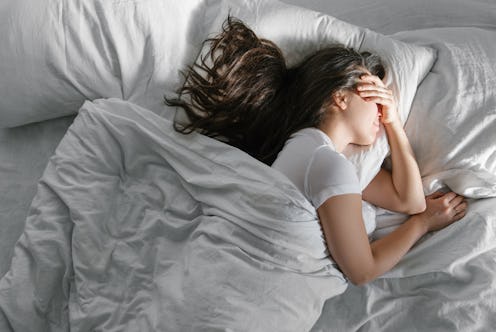Life
7 Things Your Body Is Trying To Tell You When You Can’t Fall Asleep
Most people have had one of those nights where you find yourself staring at the ceiling, unable to doze off no matter how hard you try. Although it's difficult to know exactly why you're experiencing sleeplessness, it can be useful to try to tune in to your body and figure out why you can't fall asleep at night. Everything from your mental state to the temperature in the room and even what you ate that day can affect how easily you get to sleep, so paying attention to how you're feeling may be able to help you slip into a slumber more quickly down the line.
"Most of the time people should be able to fall asleep within five to ten minutes," Alcibiades Rodriguez, MD, professor of neurology and medical director of the NYU Langone Comprehensive Epilepsy Center-Sleep Center, tells Bustle. "If it takes someone more than 30 minutes to fall asleep, that would be considered abnormal. Why it takes longer for some is a complex question and depends on each patient, but this is also the definition of insomnia (having difficulty falling or staying asleep or waking early)."
If you're having a hard time falling asleep, you might want to start paying attention to what's going on with your health and mind. Here are seven things your body is trying to tell you when you can't fall asleep, according to experts.
1You Worked Out Too Close To Bedtime
What time of day you work out can make a difference in how easily you fall asleep. "If you work out too late in the evening, your adrenaline and endorphins can elevate, and more likely than not, you will have a hard time falling asleep," Navya Mysore, MD a family physician at One Medical, tells Bustle. However, if you're also inactive during the day, that can have a negative effect as well. "The more tired your body is, the easier it is to fall into a restful sleep, which allows your muscles to recover from your workouts."
2You Ate Too Close To Bedtime
"If you eat your meals too late at night or [you eat] very heavy meals, you might notice that your GI tract is working in overdrive to try and digest your food, which can be distracting and prevent you from falling asleep," says Dr. Mysore. "Make sure your evening meals are at least three hours before bed time and aim for lighter and smaller portions."
3You Have A Lot On Your Mind
Many people are left awake at night because of their racing thoughts. "Anxiety and depression may be playing a role by keeping your mind too active before bed and thus preventing you from getting tired," Dr. Rodriguez says. Managing your mental health — or any stress or worries you may have — is important to help you fall asleep and stay asleep more easily.
4You Had Too Much Caffeine
Most of us know that caffeine is a stimulant, and any amount of a stimulant can make it hard to fall asleep, even if you avoid it at night and have it earlier in the day. "Make sure to stick to one to two cups a day," Dr. Mysore says. "If you're sensitive to caffeine, avoid coffee in the afternoon, and try options with less caffeine like matcha or black tea."
5You're Stimulated From Too Much Light
Our natural circadian rhythm has us rising with the light of sun and sleeping when it's dark. Artificial light can mess with this natural body clock "With rising amounts of work responsibilities and social media usage, we are on our computers and phones throughout the day and into the night," Dr. Mysore says. "The light and stimulation from the screens impact our own circadian rhythm, and we loose our natural sleep switch." Powering down a couple of hours before bed can help keep you fall asleep quicker, and be sure to dim your lights so your brain recognizes that it's night time.
6Your Body Temperature Is Too High
If you're having a hard time falling asleep at night, it's possible that your bedroom is too hot. If your body temperature is increased, it can make it harder to fall asleep. "Make sure you have a cool environment around you," Dr. Mysore says. "Opening the window or not turning on the heater in the bedroom is helpful to keep the temperature down."
7You May Have A Sleep Disorder
If you're keeping up on all your healthy habits and your sleep hygiene is good, there may be something else going on that's preventing you from getting to bed. "You may have a sleep disorder like restless legs syndrome or insomnia, etc., which prevents you from falling asleep easily," Dr. Rodriguez says. Additionally, it's possible you may have a medical disorder, such as a thyroid problem, that can cause lack of sleep.
Not being able to sleep could mean a number of things. Check in with your body, or if your sleeplessness becomes chronic, consider seeing a doctor who can help you get to the root of the problem.
